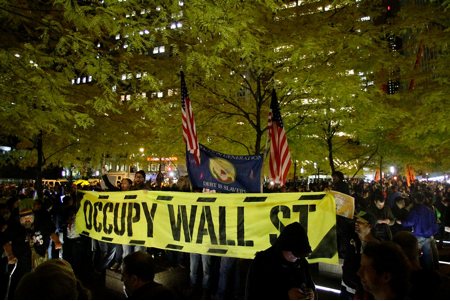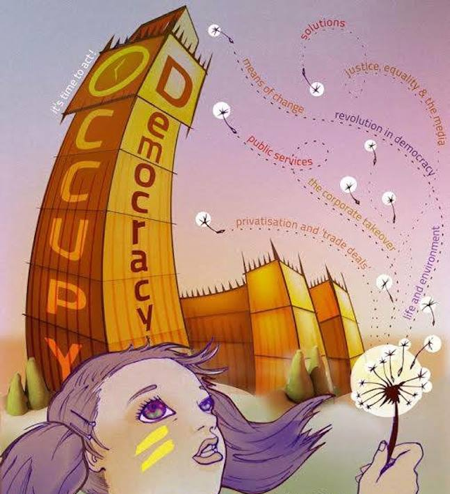
Valentine’s Day Election
February 7, 2015
STEFAN MILENKOVICH The Man Who Speaks the Language of the Eighth Note…
February 23, 2015‘What are we for?’ is one of the most pressing, yet unanswered, questions of our age. On the 5th of November last, demonstrators marched in London wearing Guy Fawkes masks; they were chanting calls to revolution, and some were arrested. Similar protests were staged around the world.
By Stephen McCarthy
This is not a new phenomen. Similar events have taken place since November 2011. The summer of 2011 saw a number of different protests across the world. In August rioting broke out in London and spread to several other English cities. These rioters did not have any articulated, grievance or objective; their aim was primarily to loot shops and take material goods, which the surrounding consumer culture constantly urges them to desire without offering them the means to possess.
In the same month, fifteen hundred environmental activists gathered outside the White House in Washington DC protesting against a planned oil pipeline from Alberta. And twelve thousand demonstrators stormed a toxic chemical plant in the city of Dalian in China. Again these environmental campaigners were sure of what they were against, but did they know what they were for? How do they imagine a world without fossil fuel energy on which modern societies so completely depend? In October of the same year a protest camp was set up outside St Paul’s Cathedral in the City of London, having been prevented from settling nearer the financial heart of the City. Similar camps had already been established in several Spanish cities and in New York. Their protest was against the greed of the banking sector, which having caused near financial collapse in 2007 and 2008, continued nevertheless to pay its employees huge salaries and bonuses and to receive unimaginable levels of support from the state. These protesters, like the others, knew what they were against – the appalling rise in income inequality across the Western world – but did not seem to know what they were for.
That is the question to be addressed: what are we for? – both a political question and a philosophical one. It concerns our environment; the use of energy and its resources; distribution of wealth; economic and social justice; and human purpose. So, in what follows I begin to address some of these vital issues.
Consider first environmental campaigners. Undoubtedly the Earth faces resource and environmental constraints which sooner or later will require a huge slowing down in the consumption and disposal of material goods and chemicals and consequently of economic growth – at least in the over-developed regions of the world. The most obvious, though by no means the only, constraint on the natural eco-system is the excess of waste greenhouse gases, leading to climate change. By and large, however, the environmental movement deludes itself into thinking that, by dotting a few solar panels and wind turbines around, the climate change problem can be solved without recourse to nuclear power. But what they scarcely recognise is that solar power, in any form, is simply too diffuse; to replace a one GW coal or nuclear power station would require a continuous area of solar panels about one third of the size of Greater London. It seems inevitable that at some point energy use and material consumption will have to decline.
However we live in a world in which increasing material consumption now seems to be the only game in town. The poor rioters in London are bombarded with advertising as well as endless political discourse, that suggests that consumption is the principal aim in life; this is what life is for; this is what makes for happiness and fulfillment. Sadly, however, they’re not getting enough of it, so out of deep frustration they simply riot.
Meanwhile the Occupy Movement, squatting in New York and the City of London, knew exactly who was getting it – the wealthiest 1% of the world’s population which owns 20-30% of the world’s wealth, while the bottom 50% have no wealth at all (as Picketty’s study has demonstrated) and that disparity is continuing to increase.
In the end the only way out of all these dilemmas has to be a change in the values that the Western world has come to live by, particularly since the second half of the 20th Century. As the Harvard philosopher Michael Sandel has expressed it: we now live not just in a market economy but in a market society. Individualism and consumerism have largely replaced other sets of values – at least in what used to be called Christendom. This prevailing mind-set has become so pervasive that we are scarcely aware of it, as a fish does not know it is swimming in water. But if one regards the long sweep of human history it stands out as a highly unusual state of affairs. Most societies, while obviously needing the basic necessities of life, would have been aware of some larger human purpose – some sense of Transcendence, of God if you like. This is what life was for, this is what gave it meaning both individually and collectively, together with fruitful community and relationships – which fits with a Trinitarian perspective. Modern secular societies’ reduction of meaning to what is immediately tangible and material amounts to worshiping a false insatiable god, that of consumerism.
Fortunately false gods do not survive; indeed they can get pulled down rather unexpectedly. Eventually people will react to what Charles Taylor calls the utter ‘flatness’, the ‘emptiness’ of the ordinary. And we can see small signs everywhere that this false god is crumbling – though not necessarily being replaced by conventional religion. Small communities trying to live more simply; the transition town and permaculture movements; an increasing disillusion that the continual stream of new material trinkets does not bring lasting satisfaction and are designed to fail. (Does the I-phone 6 really offer something worthwhile that its predecessors didn’t?) And when the President of the IMF approvingly quotes Pope Francis on the injustices caused by economic equality, and then shares a platform with the Archbishop of Canterbury, then we know something curious and unexpected is happening in the world.
Studies and surveys of what actually makes people happy – conceptually flawed though they may be – do indicate that matters such as the strength of community and relationships, some feeling of stability and security, supporting and helping others, as well as some larger religious belief are the major contributors to happiness. Material prosperity, once the basic needs of life have been met, have a relatively small impact. Indeed, when one thinks about it, it’s rather obvious. We really could live fulfilled lives with much less material and energy consumption than we have become used to. The pity is that this truth seems to bear so little relationship to current political discourse, which places economic growth at the centre of almost every policy. But, in reality, rapid economic growth is a phenomenon of just the last two or three hundred years. For most of human history it was negligible. So why its centrality in today’s political discourse? One approach to answering this question is to consider how politics and economic policy would have to change if the objective of ever-increasing material consumption, that is economic growth, were to fall away (at least in those parts of the world where the population has already grown fat).
One big perceived issue is the need to maintain ‘full employment’ – whatever that means exactly. A steady-state economy, as I am imagining here, will not be a world frozen in a technological time warp. Humankind will continue to be inventive. So, since technical change and innovation lead to a continuing increase in factor productivity, then, for a constant level of output, ever fewer labour inputs will be required. Consequently the maintenance of full employment, necessarily requires a rising level of economic output, of both goods and services, to offset this increasing technical efficiency. Looked at another way, in moving to a steady-state economy of ‘sufficiency’ rather than of excess, the requirement for paid work will decline. Either average working hours, or the proportion of the population who are employed, will fall. And those who do not have paid work will consequently not be able to share in economic output.
What we need here is a paradigm shift concerning the social mechanisms for sharing economic output. The current, perceived, paradigm is that output is shared through paid employment. Along with this goes the implication that only those in paid work are making a useful and worthwhile contribution to the economy. But it doesn’t have to be like this. Everyone in a particular society could enjoy the right to a share in economic output whether they were engaged in paid work or not. One possible mechanism to achieve this would be for the state to pay a basic income (even at a low level) to all. Those who wanted a higher income would still engage in paid work if they wished to do so – and of course some care would need to be taken that the work that did need doing was sufficiently remunerative to get done.
In fact the current paradigm is something of a myth. It blithely disregards the high proportion, anything up to forty percent of adults, never mind children, who are not in paid work – the retired the sick, the unemployed, housewives and house-husbands and the idle rich. Thus the necessary paradigm shift would not be like a revolution; it would more resemble a conversion. It would not immediately change the facts on the ground, but it would change our perception of and approach to sharing the undoubted prosperity that western societies already enjoy. Indeed a few societies, such as Denmark are already probably close to this changed perception, this conversion. But Denmark is an exceptionally cohesive community. Sadly most western societies are actually moving in the opposite direction – increasing disparities in income, and particularly in wealth, are driving social cohesion apart. As one commentator has observed: inequality is the solvent which dissolves the cohesiveness of a society.
This brings us back to the Occupy Movement. The very wealthy, by means of the power that wealth confers, are already subverting supposedly democratic polities – as can be seen in the US, Italy, the UK and indeed in almost every country in the world. So in the existing political framework, it is quite uncertain what can or will be done about rising inequality. Picketty argues for the global taxation of wealth, but, just as turkeys don’t vote for Christmas, the wealthy’s control over the political process makes such taxation improbable. They argue, plausibly but erroneously, that we need great disparities in wealth simply for our capitalist economies to function.
So, again, what is the Occupy Movement for? Is it for revolution? Sadly the history of revolutions is that they quickly move beyond the ideals of their original protagonists. So should we be over-turning the money-lender’s tables? Or can we proclaim and foster a process of conversion? Certainly, the false god of material consumerism will not survive; sooner or later the prevailing values and economic paradigms will die away. We just have to open our eyes to what now seems unthinkable: that one day humanity will rediscover the mystery that lies beyond the merely tangible and that consequently we will be able to build again social and philosophical structures capable of maintaining the Earth’s delicate eco-system on which we depend and of achieving a fairer distribution of the bountiful resources that it provides.
The author is a former staff member of the European Investment Bank (EIB). Prior to joining the EIB, Stephen McCarthy worked as an economist in the government of Botswana – one of the very few successful African countries at that time. Stephen is a Renaissance polymath: not for him the narrow specialisation. A physicist by training, he then moved on to economics and from there to development finance. He has published two books on African development and has also edited a collection of theological essays. An extended version of this article, The Environment, the Economy and the Good Life, was published by the EIB Institute in 2014.







